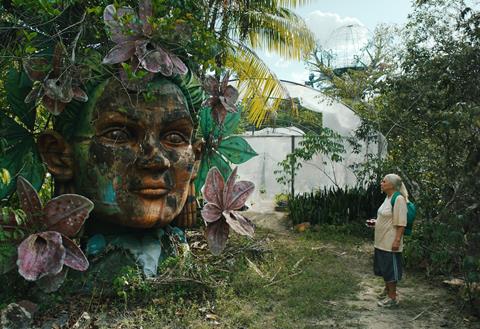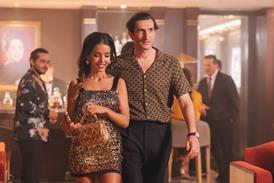Berlin Competition premiere looks set for a long healthy life

Dir. Gabriel Mascaro. Brazil/Mexico/Netherlands/Chile 2025. 86mins.
Gabriel Mascaro’s The Blue Trail is a balmy riverboat ride into the unknown – as well as a bolshy protest against ageism and a warning about possible authoritarian futures, in Brazil and elsewhere. Brazilian filmmaker Mascaro captured attention with working-class drama Neon Bull (2015), but his new film is a somewhat gentler follow-up to 2019’s Divine Love, which was a stylised vision of a fundamentalist dystopia.
A very plausible vision of a dark and hypocritical future
Centred on a winning performance from Brazilian stage and screen veteran Denise Weinberg, with support including international star Rodrigo Santoro (300, Westworld et al), The Blue Trail is entrancingly unpredictable in its picaresque unravelling, tinged with magical realist touches. Following its bow in Berlinale Competition, the film is likely to tow satisfied international audiences in its wake.
Weinberg plays Tereza, a 77-year-old woman who works in a factory that processes alligator meat. She’s happy and confident living alone, but she is a citizen of a future Brazil in which older people have a strange status. They are celebrated with laurels placed on their homes, and told that they are honoured participants in a thriving society, with planes flying overhead broadcasting messages in their honour. Tereza is even informed she is now officially a “national living heritage.”
But we soon discover the flip side of this veneration: older people are forced to retire and are placed under the official guardianship of their children, unable to make the simplest purchases without producing ID and having transactions cleared by their family. And if they transgress, they are rounded up and transported in what the subtitles call ‘Wrinkle Wagons’ – essentially senior-citizen dog-catcher vans. What also awaits them is transfer to the ‘Colony’ – supposedly a much-desired rest home, but quite clearly a dumping ground for people no longer seen as a useful part of the workforce.
Before being packed off, Tereza decides to fulfil her dearest wish: to take a plane journey. But that will involve securing an illegal flight from a backwater on the Amazon – so she hitches a ride with taciturn riverboat skipper Cadu (Santoro). En route, they are forced to stop – which is when Cadu introduces Tereza to the mysterious ‘blue drool snail’, whose slime, used as eye drops, enables the user to see their destiny. Tereza’s journey then suffers a major hiccup, but her tenacity wins out and she is soon back on the water with Roberta (Miriam Socarras), a rakish free spirit of Tereza’s age. Known as the Nun, Roberta makes a living selling digital bibles but believes only in freedom – which she has managed to secure at a price.
With its narrative roots in a dark vision of institutionalised ageism – not dissimilar from the scenario of twice-filmed Japanese drama The Ballad of Narayama – The Blue Trail successfully avoids the traps of winsome impishness that so often affect stories about fights for late-life independence, which can easily play out as condescending despite best intentions. Here, Weinberg decisively establishes Tereza’s no-bullshit attitude from the start, and she and the brash, characterful Socarras make a magnificent team once they meet up in the latter part of the journey. Santoro also makes a strong impression as the tough loner who proves very vulnerable, confessing his woes to Tereza in a hallucinated trance (the actor’s candid eyes here tinged a weird blue).
Mascaro and production designer Dayse Barreto create a very plausible vision of a dark and hypocritical future – a world less visibly hi-tech than Divine Love, the rules here mainly established through adverts and glimpses of mendacious propaganda videos (plus the odd piece of graffiti, like ‘Give Me Back My Granddad’). The rare moments where the film jumps into a magical-realist mode – not in the least jarringly – are in the snail sequences and in Tereza’s visit to a very singular gambling den.
Throughout, the film follows its own twisting route, by water or otherwise, with DoP Guillermo Garza capturing some magnificent river vistas. Memo Guerra’s score is slathered on a little thickly, occasionally overplayed as a comic commentary, but overall its unconventional jazzy textures and rhythms nicely fit the tone of a film that pretty much has its eccentricity calibrated perfectly.
Production companies: Desvia Filmes, Cinevinay
International sales: Lucky Number, olivier@luckynumber.fr
Producers: Rachel Daisy Ellis, Sandino Saravia Vinay
Screenplay: Gabriel Mascaro, Tibério Azul
Cinematography: Guillermo Garza
Production design: Dayse Barreto
Editors: Sebastián Sepúlveda, Omar Guzmán
Music: Memo Guerra
Main cast: Denise Weinberg, Rodrigo Santoro, Miriam Socarrás, Adanilo

















![2026_FORUM_LETTER TO ALVIN_Main still[59]](https://d1nslcd7m2225b.cloudfront.net/Pictures/100x67/6/9/5/1469695_2026_forum_lettertoalvin_mainstill59_712728_crop.jpeg)




